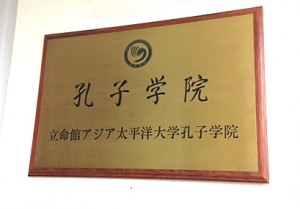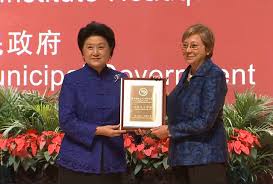Confucius Institutes are closing one after another in the U.S.
Establishment Confirmed at 13 Universities in Japan
In a cabinet decision on May 12, the Japanese government revealed that Confucius Institutes, educational institutions run by the Chinese government, have been established at at least 13 universities in Japan.
The 13 universities confirmed to have Confucius Institutes in Japan are Waseda University, Ritsumeikan University, Oberlin University, Musashino University, Aichi University, Kansai University of Foreign Studies, Osaka Sangyo University, Okayama University of Commerce, Hokuriku University, Fukuyama University, Yamanashi Gakuin University, Ritsumeikan Asia Pacific University, and Sapporo University.
The Chinese government had been promoting the establishment of Confucius Institutes as non-profit educational institutions at universities and other institutions around the world, but the Ministry of Education, Culture, Sports, Science and Technology (MEXT) had demanded that the universities make their operations more transparent, as they have been pointed out as spy and propaganda (political propaganda) organizations of the Chinese Communist Party.
In the U.S., the academy had been offered at more than 100 U.S. university campuses from the late 2000s to the early 2010s, but Congress expressed concern about the possibility of infringement of academic and expressive freedom, espionage, and intellectual property theft, and the academy has been shut down one after another in the U.S. However, looking at the world as a whole, it is said that there are still more than 550 Confucius Institutes in over 160 countries and regions.
The reality of Confucius Institutes and
Domestic Universities to Watch Out For
Confucius Institutes were first established in South Korea in 2004 for the purpose of “promoting Chinese language and culture abroad.
Although the Confucius Institute is a non-governmental organization (NGO), it is in fact a national project managed by the National Office for the Promotion of Chinese Language and Culture under the Chinese Ministry of Education (equivalent to the Ministry of Education, Culture, Sports, Science and Technology), with the Chinese Communist Party leadership behind the decision-making process.
Incidentally, although the Confucius Institute bears the name of Confucius, the founder of Confucianism, it is not an educational institution related to Confucianism at all.
When opening a Confucius Institute in Japan, a contract is concluded between the university and the Chinese Language Office. Since no legal approval or notification of establishment is required, approval from the Ministry of Education, Culture, Sports, Science and Technology (MEXT) or other authorities is not necessary.
For this reason, the Chinese government provides funds to the university where the Confucius Institute is established for its operation, and the contract allows the university to freely determine how to hire faculty members and other matters.
From the perspective of Japanese universities, there are many advantages because the Chinese government provides support for the costs of setting up and operating a Confucius Institute, so the university bears almost no burden and can provide Chinese language education to students at a low cost and recruit students at the same time.
The process of establishing Confucius Institutes in Japan is as follows.
Of the above Confucius Institutes, the three universities marked with an asterisk (*) should be noted (the Confucius Institute at Kogakuin University, one of these universities, was closed at the end of March 2009).
The Beijing University of Aeronautics and Astronautics, which was affiliated with Kogakuin University, is one of the seven national defense schools directly under the State Defense Science and Technology Industry Bureau, which manages China’s military enterprises. The university is on the Foreign User List, which requires permission from the Ministry of Economy, Trade and Industry when exporting goods or technology because of suspicion of developing missiles with weapons of mass destruction.
Peking University, which is affiliated with Ritsumeikan University and Waseda University, is also considered a quasi-defense university and is controlled by the State Defense Science and Technology Industry Bureau.
Confucius Institutes are Dangerous
Three Reasons
There are three dangers of Confucius Institutes.
The first is the opaqueness of the contract between the Confucius Institute and the host university.
According to a report by the US Senate Committee on Homeland Security and Governmental Affairs
The Chinese government has provided more than $150 million (approximately 20 billion yen) in funding to U.S. educational institutions in connection with the Confucius Institute.
The Chinese government controls the Confucius Institute’s budget, educational content, and personnel.
Confucius Institute faculty members pledge to defend China’s national interests
The Confucius Institute is not privy to the details of the contract between the Confucius Institute and the university.
The content of the contract between the Confucius Institute and the university is undisclosed, pointing out the possibility that a highly problematic contract has been concluded between the Confucius Institute and the host university. In Japan, the content of the contract is not structured to be reviewed by the Ministry of Education, Culture, Sports, Science and Technology (MEXT) or other organizations.
Second, the establishment of a Confucius Institute within a Japanese university under the control of the Chinese government, without any review by the MEXT or other Japanese government agencies, raises extremely serious concerns about the autonomy of the university and Japan.
The Confucius Institute, which has been pointed out around the world as a spy agency and propaganda arm of the Chinese Communist Party, has been allowed to remain in Japan.
Incidentally, according to some media reports, in 2010 the director of Osaka Sangyo University apologized and resigned after receiving significant backlash from Chinese students and others on campus for calling the Chinese Language Office, which runs the Confucius Institute, a spy agency, and this story was published in the People’s Daily, the official newspaper of the Chinese Communist Party.
In any case, under the control of the Chinese government, the content of education is controlled and educational freedom is infringed upon. This leads to the propaganda operations described below.
The third point is the danger of propaganda operations and espionage.
I would like to explain what exactly this is as follows.
Using Confucius Institutes.
Propaganda operations by the Chinese government using Confucius Institutes
Propaganda operations by the Confucius Institute are positioned as “sharp power.
Sharp power is positioned between “hard power,” such as military power, and “soft power,” such as culture, education, and values.
In general, public diplomacy is a method of fostering a sense of familiarity and goodwill toward one’s own country among the public opinion of the other country through soft power, and of gaining the public opinion of the target country as an ally to serve the interests of one’s own country.
The Confucius Institute was a representative example of this method, but it has been criticized as sharp power because of its heavy-handed and arrogant elements unique to an authoritarian state such as China.
The method is as follows.
First, in the Confucius Institute, students are exposed to a great deal of Chinese culture and language as a friendly cultural and educational exchange. Then, after familiarizing the students with Chinese culture, they are invited to study in China or are invited to study in China, and are nurtured as pro-Chinese. It is important to note that we do not mention the Uyghur human rights issue or Hong Kong oppression in this process, but softly educate and instill China’s claims on the Taiwan issue, Senkaku Islands issue, and so on.
When I talked with a Japanese acquaintance of mine who studied in China for a long time, he looked indignant when I raised the Uyghur human rights issue with him and said, “I thought that there was no evidence in the first place when I studied in China. He tried to be smarmy, saying, “I thought so when I studied abroad, but there is no evidence in the first place, and no one in China is making an issue of it.
Regarding the Senkaku issue, he said, “We have to listen to China’s claims as well. It is no use listening only to Japan’s claims,” he would reply from the perspective of China. He even told me, “If you come to China, you will understand” (If I went to China, I would probably be detained under the Anti-Spying Law).
As a working student of the Confucius Institute, for example, he invites people in the media to travel to China, so that they can get a lot of information on the “good parts” of the country and be trained as pro-China people. The same approach could be applied to corporate executives and politicians.
In short, the Confucius Institute is a propaganda effort to provide China with only “favorable information” through Confucius Institutes and, if possible, to sensitize them and expand the pro-China camp in the countries where Confucius Institutes are established. And this is being done at leading Japanese universities without the knowledge of the Japanese government (Ministry of Education, Culture, Sports, Science and Technology).
Incidentally, this is not the only Chinese effort.
For example, according to Kyoko Kuwabara of the Japan Institute of International Affairs (JIIA), one of the assumptions underlying the Taiwan contingency is that China is seeking to divide Japan and the U.S. by claiming that Japan will be drawn into the war as a result of the activities of U.S. forces in Japan and Self Defense Forces in the event of a Taiwan contingency, in order to provoke Japan’s allergy to the military and to stimulate critical demonstrations and protest activities. This is an attempt to stimulate Japan’s military allergy to the U.S. military and to stimulate critical demonstrations and protests in Japan.
Similar situations, not limited to the Taiwan contingency, have already been seen in Japan, and it is clear that China’s intentions are at work in the background.
By Confucius Institute
Espionage Activities by Confucius Institutes
First of all, in addition to intellectual property such as research information held by the universities where Confucius Institutes are established, they are also in an environment where they have extremely close access to information on the Chinese student community and the personal connections of influential people.
In addition, as in China’s “Thousand Grains of Sand Strategy,” China attempts to steal technical information through various channels, such as businessmen and foreign students. In fact, several espionage cases involving Chinese students have been arrested in Japan in recent years.
What is particularly pernicious is that Chinese government agents contact bona fide foreign students and make them participate in espionage activities.
In the summer of 2008, when the torch relay for the Beijing Olympics was held, Chinese students from all over the country, mainly from the Chinese Student Alumni Association, were mobilized under the direction of the Chinese Embassy and other organizations (according to reports at the time, 3,000 to 5,000 people gathered), but even well-intentioned students are obedient to the wishes of the Chinese government. Therefore, it is natural to assume that the Chinese government, through the Confucius Institute, would direct information gathering and manipulation activities, or recruit them for the same activities.
Furthermore, in light of the arrest in early March of a female student studying in Japan on suspicion of violating the National Security Law for spreading information about Hong Kong’s independence on a social networking service when she temporarily returned to Hong Kong, and the surveillance activities of unofficial Chinese police in the Chinese community in Japan, it is clear that the Confucius Institute is not only conducting propaganda operations but is also involved in the activities of the Chinese government. In light of the arrests on SNS for violating the National Security Law and the surveillance of Chinese communities in Japan by unofficial Chinese police, it can be inferred that Confucius Institutes are not only engaged in propaganda efforts, but are also involved in surveillance activities and providing information and other support for these dissident movements.
In response to the Confucius Institutes
The government should show measures to deal with the situation.
The Confucius Institute was brought into the spotlight in the press this time in response to a written question by Sohei Kamiya, a member of the House of Councillors.
In 2021, a Liberal Democratic Party member of the House of Councillors, Haruko Arimura, addressed Confucius Institutes in a question at the House of Councillors Committee on Education and Science, and then-Minister of Education, Culture, Sports, Science and Technology Koichi Hagiuda clearly stated for the first time that the government would take action against Confucius Institutes. In the past, Liberal Democratic Party Lower House Representative Suina Sugita also addressed Confucius Institutes in the Budget Committee (Subcommittee 4).
While other countries have taken measures such as closing Confucius Institutes, Japan has not taken any clear action to address the issue. This situation should be a concern for Japan in the current severe international situation.
Japan needs to show clear measures to deal with this situation.
And, society should also raise its interest in this issue.
Finally, I must say that it is wonderful to experience Chinese culture, learn the Chinese language, and deepen mutual understanding, and I have wonderful Chinese friends.
On the other hand, I hope that this report will make people aware of the concerns about Confucius Institutes in society, and that Japan will take even a small step forward in addressing this issue.
(Yu Inamura, Representative Director, Japan Counter Intelligence Association)











